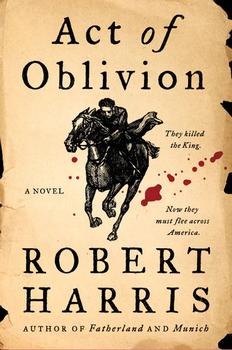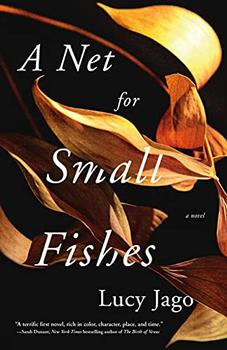Summary | Excerpt | Reviews | Beyond the book | Read-Alikes | Genres & Themes | Author Bio

In London 1664, Balthasar de St. Michel or "Balty" has no discernable skills besides pestering his brother-in-law Samuel Pepys, Clerk of the Acts of the Royal Navy, for money or a job. Eager to be rid of his "pointless, impecunious" relative, Pepys arranges a position for Balty in New England hunting two judges involved in the execution of King Charles I.
King Charles II has ascended the throne, and the people responsible for the first Charles' death have been apprehended and cruelly executed – except Edward Whalley and his son-in-law, William Goffe. While believed to be a fool's errand – the two men have evaded capture for nearly four years – Balty cannot refuse a crown commission, nor a chance at a job. He must travel to New England and try to capture the regicides.
Following a long Atlantic voyage in which Balty spends countless weeks violently ill, he receives a lackluster welcome in Boston. This sets the tone for much of the journey as Balty encounters Puritans unhappy to have an agent of the crown poking his nose in their anti-royalist colony. Indeed, the odds seem insurmountable as Balty also comes across native Americans eager to dispose of more white men on their land, wild catamounts (cougars), and many other unsavory characters in this New World. Luckily, weathered New England veteran Hiram Huncks, also an agent of the crown, has been appointed to accompany the bumbling Balty on his mission. With a mysterious past, and even more mysterious motivations, Huncks forges this unlikely alliance and together he and Balty travel the New England wilderness in search of the criminals.
The Judge Hunter perfectly encapsulates the style and feel of an era while making it accessible to today's readers. At times the novel is woven through with today's sensibilities, sprinkled with subtle wit and humor that seems markedly understated and, despite Buckley's American's lineage, markedly British. During a daring escape, Balty must exit an inn from the roof, inevitably slipping and falling on a pig. A quick perspective change provides comic relief as "(t)he pig, unaccustomed to serving as a nocturnal cushion for defenestrated humans, squealed vehemently."
While Buckley's humor is highly entertaining, it at times compromises some of the characters. Certain figures seem more like caricatures meant to elicit another laugh. This is at times problematic in the representation of Native American voices either portrayed as violent "savages," like Repent, the Quiripi Indian who kills the husband of a white woman he lusts after, or as too eager to please, like the servant girl, Me-Know-God. At times, they are both.
Part of the blame for such portrayals lies with the prevalent attitudes during the time period. And Repent does later talk about the violence inflicted upon the Native Americans by the colonists. However, his voice seems stilted and childlike, particularly when recalling his own violent actions against the settlers: "The white farmer hid them and mocked him…The white farmer and his woman and boy suffered for this." Repent seems devoid of the charm and wit many of the English characters possess. He simply responds to his thoughts and feelings without any empathy or the weighing of consequences.
Buckley incorporates more progressive attitudes about Native Americans through Huncks, who opposes and challenges the idea that the "Almighty" meant to "clear the land" of Indians, through force or disease, for English settlers. Huncks often finds himself at odds with several ideologies throughout the novel – both royalist and anti-royalist, Puritan and Quaker, English and Native American. After an encounter with the Puritan Reverend John Davenport, Huncks notes that he doesn't "do well with certain types of pharisee" after the hypocritical tendencies and superiority complex of the Reverend are revealed.
Over their travels, Balty begins to adapt Huncks' moral compass and rejects royalist attitudes. Neither does he embrace the anti-royalist sentiment prevalent in New England. He no longer wishes to apprehend the judges and receive a fancy English title, but would rather "avenge the death of a few farmers" than "catch killers of a king." The humor Buckley uses with Balty's adventures does not mask the horrors he encounters but exposes them in a new light. This new light is Balty's perspective throughout the novel, one of a "civilized" Englishman who believed one set of rules – English rules – governed life. As Balty begins to recognize the absurdity of these assumptions, he becomes his own judge of right and wrong without a religious institution dictating what that looks like.
While the novel is historical, these themes are particularly exigent today. It acknowledges America's troubled past built on the murder of indigenous peoples and fraught with religious persecution despite the promise of religious freedom. Yet it also successfully reflects current divides in our own culture over religion and a strict adherence to a particular doctrine. The novel does not discount religion, but specifically its fundamentalist tendencies. Buckley's combination of humor and history creates a compelling satire of our own modern existence.
![]() This review was originally published in The BookBrowse Review in July 2018, and has been updated for the
July 2019 edition.
Click here to go to this issue.
This review was originally published in The BookBrowse Review in July 2018, and has been updated for the
July 2019 edition.
Click here to go to this issue.

If you liked The Judge Hunter, try these:

by Robert Harris
Published 2023
From the bestselling author of Fatherland, The Ghostwriter, Munich, and Conclave comes this spellbinding historical novel that brilliantly imagines one of the greatest manhunts in history: the search for two Englishmen involved in the killing of King Charles I and the implacable foe on their trail - an epic journey into the wilds of seventeenth-...

by Lucy Jago
Published 2022
Wolf Hall meets The Favourite in Lucy Jago's A Net For Small Fishes, a gripping dark novel based on the true scandal of two women determined to create their own fates in the Jacobean court.
Your guide toexceptional books
BookBrowse seeks out and recommends the best in contemporary fiction and nonfiction—books that not only engage and entertain but also deepen our understanding of ourselves and the world around us.